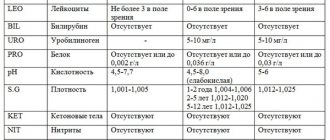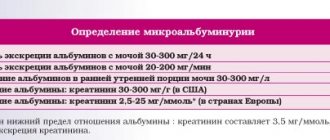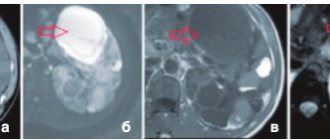Kidney failure is a condition in which the kidneys cannot cope with their function. Their ability to remove metabolic products from the blood, control fluid balance in the body, electrolyte levels, and acid-base balance is impaired. With prolonged renal failure, blood pressure increases and the level of red blood cells in the blood decreases (normally, the kidneys produce the hormone erythropoietin, which stimulates the formation of new red blood cells).
Our expert in this field:
Isaev Artur Ramazanovich
Oncologist, urologist, surgeon
Call the doctor
Kidney failure can develop at any age, but is most common in older people. It can be caused by various diseases. There are two types of renal failure, in which treatment approaches and prognosis differ:
- Acute kidney failure (AKI, acute kidney injury) is a condition in which loss of kidney function occurs quickly, over a period of days or weeks. Nitrogenous metabolic products accumulate in the blood (this condition is called azotemia), and the water, electrolyte, and acid-base balance is disturbed. Some patients experience decreased urine output, but this is not necessarily a symptom. Treatment of acute renal failure is aimed at combating the disease that caused this condition and restoring water and electrolyte balance. Some patients are indicated for dialysis (artificial kidney machine).
- Chronic renal failure (CRF, chronic kidney disease) is a gradual deterioration of kidney function over a long period of time. At a later stage, this condition manifests itself in the form of nausea and vomiting, loss of appetite, severe weight loss, fluid retention in the body, stomatitis, burning sensation and metallic taste in the mouth, decreased mental clarity, frequent urination at night, damage to peripheral nerves, seizures, epileptic seizures. Treatment is aimed at combating the disease that caused kidney failure, correcting water-electrolyte and acid-base balance, lowering blood pressure, and eliminating anemia. In later stages, dialysis is used and kidney transplantation is performed.
Severe forms of acute renal failure often lead to the death of patients. Chronic kidney failure progresses constantly, and all that can be done is to slow its progression. With the advent of dialysis and kidney transplantation, patient survival has increased dramatically. The Medicine 24/7 clinic uses the most modern treatment methods.
Request a call back. We work around the clock
Treatment of acute renal failure
If renal failure leads to dangerous complications, the patient is placed in the intensive care unit. For example, due to fluid retention in the body, pulmonary edema may develop. In such cases, oxygen therapy (oxygen therapy), drugs that dilate blood vessels (vasodilators), and diuretics are used. Another serious complication is hyperkalemia, an increase in potassium levels in the blood. It can lead to abnormal heart rhythm (arrhythmia) and muscle weakness. To combat hyperkalemia, calcium gluconate solution and other drugs are administered intravenously.
In some cases, you need to immediately switch to hemodialysis:
- an increase in the level of urea (the end product of protein metabolism) in the blood by more than 15–20 mg per day, an increasing increase in the level of potassium in the blood and blood acidification;
- threat of developing pulmonary and cerebral edema;
- lack of urine;
- irreversible severe kidney damage.
The doctor may also decide to perform hemodialysis in the following cases:
- Pulmonary edema that cannot be eliminated with medications.
- Electrolyte imbalances that cannot be treated by other means.
- Blood acidification, which is difficult to treat.
- Uremia is a dangerous condition in which, due to impaired kidney function, toxic metabolic products accumulate in the blood. It manifests itself in the form of weakness, loss of appetite, itchy skin, decreased appetite, aversion to food, especially meat products, and epileptic seizures.
During hemodialysis, the patient's blood passes through a filter in a special machine and is cleared of toxic substances. This device is often called an “artificial kidney.” For many patients with acute kidney failure, dialysis is indicated only temporarily—from a few days to a few weeks. If the kidneys are so damaged that their function is no longer restored, then hemodialysis must be performed continuously. Another solution is kidney transplantation.
In addition to hemodialysis, peritoneal dialysis is used. The walls of the abdominal cavity and internal organs of the abdomen are covered by a thin serous membrane - the peritoneum. It can work as a filter. To carry out peritoneal dialysis, you need to make a puncture in the abdominal wall, insert a tube into the abdominal cavity (it can be left for a long time) and inject a special solution - dialysate - through it. Metabolic products will penetrate from the blood into the dialysate: after some time it is drained and replaced with a new one. The advantages of this method are that the patient can learn to change the dialysate and do it manually (clinics use an automated method). This allows treatment to be carried out at home and gives the patient some freedom. In addition, peritoneal dialysis is better tolerated.
Treatment of the underlying disease that has led to impaired renal function is an important direction in the fight against acute renal failure. It is necessary to discontinue all medications that have nephrotoxicity (that can damage kidney tissue), as well as those that are excreted by the kidneys. Often, kidney failure is caused by impaired urine flow caused by stones, tumors and other causes. In such cases, surgical treatment is required. Kidney function can be impaired due to the fact that there is not enough blood flowing to them, for example, due to severe blood loss, dehydration, or heart failure. Some diseases directly cause damage to kidney tissue. In some cases, the exact cause of acute kidney injury cannot be determined.
Patients with acute renal failure need to follow some recommendations regarding drinking regime and diet:
- The same amount of fluid should enter the body
- Minimum amount of sodium (table salt) in the diet.
- Minimum amount of potassium in the diet. It is necessary to reduce the consumption of foods that contain a lot of this element: tomatoes, potatoes, spinach, oranges, bananas, etc.
Chronic kidney disease
Symptoms of kidney failure in the chronic course of the disease occur gradually. Signs of the disease may increase, disappear, or appear suddenly. This state of affairs makes the diagnostic process quite difficult.
The following diseases lead to chronic renal dysfunction with subsequent failure:
- pyelonephritis;
- kidney tuberculosis;
- nephritis;
- hydronephrosis;
- oncology;
- polycystic kidney disease.
Various endocrine diseases, cardiovascular pathologies and others can also have a negative impact.
According to experts, delayed symptoms in renal pathologies occur due to the fact that over time, healthy tissue of paired organs compensates for the damaged tissue. But soon the damaged tissue grows so large that the kidneys stop functioning normally.
Treatment of chronic renal failure
For chronic kidney diseases, treatment is aimed at combating the causes of renal failure and correcting disorders that have developed in the body:
- Maintaining blood pressure at optimal values. According to modern recommendations, the maximum values are 140 and 90 mmHg. Art. Experts from the American Heart Association recommend maintaining blood pressure at a level no higher than 130 and 80 mmHg. Art.
- Reducing blood cholesterol levels. For this purpose, drugs from the statin group are used.
- In patients with diabetes, it is necessary to keep blood glucose levels under control.
- Hyperphosphatemia (increased levels of phosphate in the blood) is combated with diet and phosphate binders.
- Patients with heart failure, severe edema, and blood sodium levels less than 135 mmol/L should limit fluid intake.
- If you have edema, high blood pressure, or protein in your urine, you should limit your sodium intake to less than 2 grams per day.
- Some patients may need to limit their potassium intake.
- For metabolic acidosis - “acidification” of the blood - an alkaline diet and sodium bicarbonate are prescribed.
- For anemia, drugs that stimulate erythropoiesis (the formation of new red blood cells) and iron supplements are used. In some cases, red blood cell transfusions are performed.
- Some patients may need to limit their protein intake.
- In case of vitamin D deficiency, vitamin D medications are prescribed.
- Heart failure is treated with diuretics, limiting sodium intake, and in some cases, dialysis.
Dialysis for chronic renal failure is necessary when symptoms of uremia occur, or when the patient has a decreased volume of circulating blood, an increased level of potassium in the blood, or acidification of the blood, if these conditions cannot be effectively eliminated by other means. In case of advanced chronic renal failure, kidney transplantation is indicated.
We will call you back
Leave your phone number
Other signs
What other symptoms may indicate kidney failure? According to doctors, if treatment for the disease in question was not started on time, then the following may be added to the main symptoms listed above:
- problems with consciousness;
- dyspnea;
- drowsiness;
- the appearance of hematomas on the body.
In addition, in advanced cases, signs of kidney failure become more severe. Patients often experience fainting and even coma.
Treatment of other diseases starting with the letter - o
| Treatment of obstructive bronchitis |
| Obesity treatment |
| Treatment of burns of the larynx |
| Treatment of herpes zoster |
| Treatment of adrenal tumors |
| Treatment of tracheal tumors |
| Treatment of ARVI |
| Treatment of orchitis |
| Treatment of osteoarthritis |
| Treatment of osteomyelitis |
| Treatment of osteoma |
| Treatment of osteoporosis |
| Treatment of osteochondrosis |
| Treatment of osteochondropathy |
| Treatment of acute abdomen |
| Treatment of acute intestinal failure |
| Treatment of acute mesenteric ischemia |
| Treatment of laryngeal edema |
| Treatment of otitis media |
| Treatment of pityriasis versicolor |
The information is for educational purposes only. Do not self-medicate; For all questions regarding the definition of the disease and methods of its treatment, consult your doctor. EUROLAB is not responsible for the consequences caused by the use of information posted on the portal.
Treatment process
Treatment for kidney failure should be done in stages. Only an experienced specialist who is based on the results of analysis and other medical research has the right to carry out therapy.
Acute renal failure can be completely cured. As for chronic disease, therapy for such a disease is a rather lengthy process. However, a complete cure may never occur.
Each stage of the disease involves performing specific actions:
- The first stage is the treatment of the underlying disease, which involves eliminating inflammation in the kidneys. For these purposes, doctors prescribe antibiotics and herbal decoctions (infusions from ready-made pharmaceutical preparations, lingonberry leaves, plantain, coltsfoot leaves, knotweed, horsetail, birch leaves). Birch and pumpkin juices are also used as additional means.
- The second stage involves reducing the rate of progression of renal failure by taking herbal preparations such as Lespenefri and Hofitol.
- The third stage of the disease involves treatment of possible complications, namely anemia, arterial hypertension, and cardiovascular complications.
- The fourth stage involves maintenance therapy, which includes blood transfusions, as well as preparation for replacement treatment - peritoneal dialysis and hemodialysis.
- The fifth stage of treatment is associated with renal replacement therapy.
It should also be noted that if the kidneys are unable to perform their main function, patients undergo intraperitoneal dialysis or hemodialysis using an “artificial kidney” machine.
In very severe and advanced cases, an urgent donor organ transplant is required.
Treatment of renal failure in cancer
Treatment of acute renal failure in cancer patients is usually carried out in a hospital setting. If severe, life-threatening complications occur (pulmonary edema, hyperkalemia, severe disturbances of water-electrolyte, acid-base balance), the patient is placed in the intensive care unit. Emergency measures are carried out here, the patient’s vital functions are monitored using cardiac monitors and other devices. Euroonco clinics have intensive care units equipped with the latest equipment. It has everything you need to provide cancer patients with life-threatening conditions with all the necessary types of assistance at any time of the day, as quickly as possible.
In some cases, there are indications for hemodialysis or hemofiltration (artificial kidney device):
- severe disturbances in electrolyte levels when they cannot be normalized by other means;
- persistent pulmonary edema during drug therapy;
- acidosis (decrease in blood pH, its “acidification”), which is difficult to combat;
- signs of uremia - a serious condition associated with the accumulation of toxic substances in the blood: vomiting, asterixis (involuntary movements of the hand), epileptic seizures, lethargy, pericarditis (inflammation of the pericardial sac).
Euroonco uses a modern device for highly effective extracorporeal detoxification, Multifiltrate Fresenius (Germany).
It is important to eliminate the causes that led to renal failure, for example, change the treatment regimen if it includes nephrotoxic drugs, remove a tumor or stone that interferes with the outflow of urine, carry out effective antitumor therapy, and treat tumor collapse syndrome.
Other measures for acute renal failure:
- Normalization of water balance. If hypovolemia (decreased blood volume) occurs, infusion therapy is performed. If, on the contrary, fluid retention occurs in the body, diuretics (diuretics - but they are not always effective) are prescribed.
- High levels of potassium in the blood lead to heart rhythm disturbances and muscle weakness. To correct this disorder, intravenous infusions of calcium gluconate, dextrose sugar and insulin are used. Next, sodium polystyrene sulfonate, diuretics, and, if necessary, dialysis are used.
- Calcium supplements - when its level in the blood decreases.
- Adequate nutrition - 0.8 g of protein per kilogram of body weight per day.
- Fluid intake adequate to its losses through urine, stool, vomiting, sweat, etc.
- Restriction of sodium and potassium.
In chronic renal failure, in addition to treatment aimed at the cause, it is important to combat complications. In the early stages, drug therapy can be used. Prescribed medications that lower blood pressure and the level of “bad” cholesterol in the blood (for arterial hypertension and atherosclerosis), medications to combat anemia, edema, strengthen bones, and a low-protein diet.
In later stages of chronic renal failure, dialysis and kidney transplantation are indicated.









